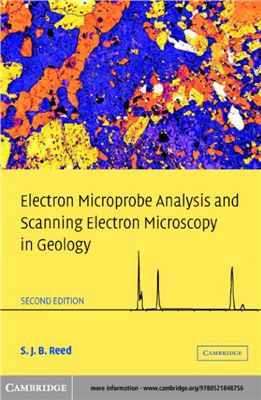Cambridge University Press, 2005, 192p.
Originally published in 2005, this book covers the closely related techniques of electron microprobe analysis (EMPA) and scanning electron microscopy (SEM) specifically from a geological viewpoint. Topics discussed include: principles of electron-target interactions, electron beam instrumentation, X-ray spectrometry, general principles of SEM image formation, production of X-ray 'maps' showing elemental distributions, procedures for qualitative and quantitative X-ray analysis (both energy-dispersive and wavelength-dispersive), the use of both 'true' electron microprobes and SEMs fitted with X-ray spectrometers, and practical matters such as sample preparation and treatment of results. Throughout, there is an emphasis on geological aspects not mentioned in similar books aimed at a more general readership. The book avoids unnecessary technical detail in order to be easily accessible, and forms a comprehensive text on EMPA and SEM for geological postgraduate and postdoctoral researchers, as well as those working in industrial laboratories.
Originally published in 2005, this book covers the closely related techniques of electron microprobe analysis (EMPA) and scanning electron microscopy (SEM) specifically from a geological viewpoint. Topics discussed include: principles of electron-target interactions, electron beam instrumentation, X-ray spectrometry, general principles of SEM image formation, production of X-ray 'maps' showing elemental distributions, procedures for qualitative and quantitative X-ray analysis (both energy-dispersive and wavelength-dispersive), the use of both 'true' electron microprobes and SEMs fitted with X-ray spectrometers, and practical matters such as sample preparation and treatment of results. Throughout, there is an emphasis on geological aspects not mentioned in similar books aimed at a more general readership. The book avoids unnecessary technical detail in order to be easily accessible, and forms a comprehensive text on EMPA and SEM for geological postgraduate and postdoctoral researchers, as well as those working in industrial laboratories.

